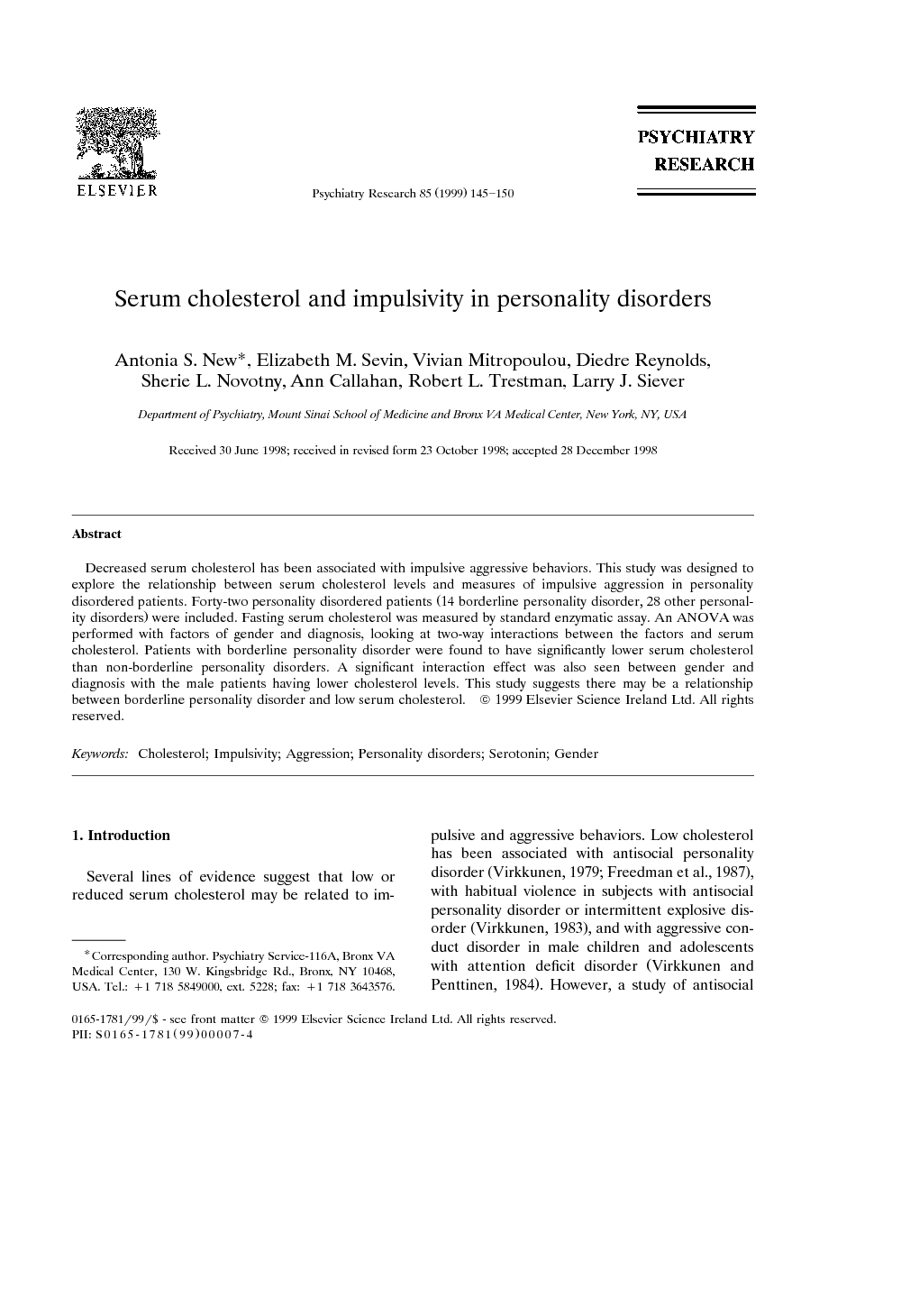Decreased serum cholesterol has been associated with impulsive aggressive behaviors. This study was designed to explore the relationship between serum cholesterol levels and measures of impulsive aggression in personality disordered patients. Forty-two personality disordered patients (14 borderline personality disorder, 28 other personality disorders) were included. Fasting serum cholesterol was measured by standard enzymatic assay. An ANOVA was performed with factors of gender and diagnosis, looking at two-way interactions between the factors and serum cholesterol. Patients with borderline personality disorder were found to have significantly lower serum cholesterol than non-borderline personality disorders. A significant interaction effect was also seen between gender and diagnosis with the male patients having lower cholesterol levels. This study suggests there may be a relationship between borderline personality disorder and low serum cholesterol.
Several lines of evidence suggest that low or reduced serum cholesterol may be related to impulsive and aggressive behaviors. Low cholesterol has been associated with antisocial personality disorder (Virkkunen, 1979; Freedman et al., 1987), with habitual violence in subjects with antisocial personality disorder or intermittent explosive disorder (Virkkunen, 1983), and with aggressive conduct disorder in male children and adolescents with attention deficit disorder (Virkkunen and Penttinen, 1984). However, a study of antisocial personality disorder in male psychiatric inpatients found no relationship between cholesterol and aggressive behavior (Stewart and Stewart, 1981). Animal studies have shown that male monkeys randomized to a low fat/low cholesterol diet behaved more aggressively and were less affiliative than those on a high fat/high cholesterol diet (Kaplan et al., 1991 and Kaplan et al., 1994).
A second line of evidence is based upon a number of reports that suggest that pharmacologically lowering serum cholesterol, in order to reduce the risk of atherosclerotic disease, may increase the risk of non-illness-related mortality (death by suicide or trauma-related death often related to impulsive-aggressive behavior) (Report from the Committee of Principal Investigators — WHO, 1978; Lipid Research Clinic, 1984; Frick et al., 1987).
A third line of evidence suggests that low cholesterol per se may be associated with a higher risk of non-illness-related mortality. Some studies have suggested that low baseline serum cholesterol may be associated with an increase in non-illness-related mortality (deaths by trauma or suicide) (Muldoon et al., 1990 and Muldoon et al., 1993; Lindberg et al., 1992; Neaton et al., 1992; ; Kunugi et al., 1997; Maes et al., 1997), while others have not (Pekkanen et al., 1989; Smith et al., 1992; Markovitz et al., 1997). The cause of the increase in non-illness-related mortality in most of the studies has been the result of an increase in death by suicide in the low cholesterol group (Lindberg et al., 1992; Muldoon et al., 1993; Maes et al., 1997; Kunugi et al., 1997). The association between low serum cholesterol and suicide attempts has also been reported in psychiatric inpatients (Golier et al., 1996; Zureik et al., 1996; Kunugi et al., 1997), although some authors have reported this association only in patients with violent suicide attempts (Maes et al., 1996).
The present study examines the relationship between serum cholesterol and measures of impulsivity and hostility in patients with mood and personality disorders. We hypothesized that patients with borderline personality disorder would have lower fasting serum cholesterol than patients with other personality disorders, as borderline personality disorder is characterized by impulsivity, impulsive aggression, and suicide attempts. We further hypothesized that serum cholesterol would be inversely correlated with dimensional measures of impulsivity and impulsive aggression.


